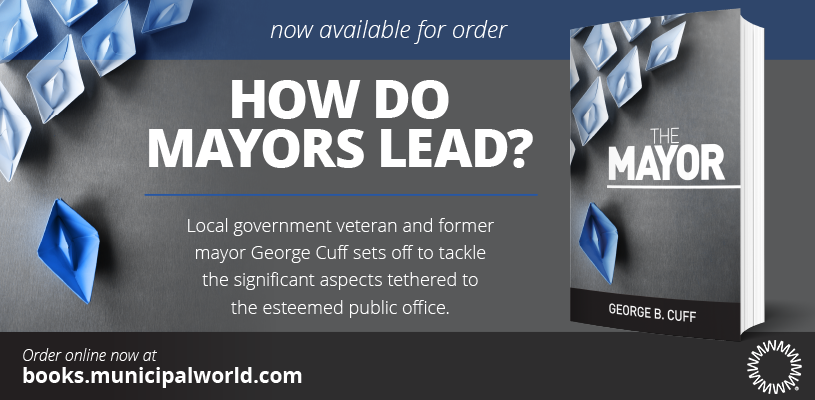Municipal work and the death of the watercooler culture

The COVID-19 pandemic has transformed how municipal staff work. Before global lockdowns, staff predominately worked from municipal buildings. This typical model inverted during lockdown measures with staff often working from home. Staff took on the challenges of homeworking without experience in how it would impact their roles.
Paul Martin saw this situation up close as the chief executive of two London, U.K. boroughs – Wandsworth and Richmond upon Thames. During the 2020 ICMA virtual conference, Martin shared his thoughts about the impacts of homeworking by pointing to one U.K. study. The survey showed only 18 percent of the workforce as a whole was operating from home prior to the pandemic. That number rose to 54 percent during the initial phase of the COVID-19 lockdown in the U.K.
Work-from-Home the New Staff Normal
Statistics suggest the work-from-home model won’t be going away, even after the pandemic is dealt with.
“The data expects 37 percent of the workforce will work from home permanently after the pandemic. So there is maybe a doubling of working from home long-term is what employers are saying,” Martin said. “I do feel that the longer this position continues, the more likely it will leave a permanent and indelible impact on patterns of working in U.K. local government.”
The study Martin pointed to stated that 28 percent of employers believe productivity is improved in the work-from-home model. However, 28 percent of employers said they believe work-from-home causes productivity to deteriorate. The survey also reveals that 37 percent of employers said working from home has no impact on productivity.
Martin said a great deal of attention in Richmond and Wandsworth has gone into speaking with municipal employees. The goal was to get their sense of the impacts of homeworking. The overwhelming feedback, he said, is that employees see working from home in a favourable light. Factors behind that perception include less commuting time, which negatively impacts staff well-being. Also, homeworking offers greater control over their work environment – particularly emphasizing individual safety.
Of course, there are also negatives. Staff have talked about mental health issues such as anxiety. Martin said this is a reasonable concern during a pandemic. There is also a lack of what he calls those “watercooler connections.” These take place between staff in unplanned interactions, leading to stronger workplace connectivity.
Political Conversations Move Online During Pandemic
While Martin offered a staff view on homeworking, Ib Østergaard Rasmussen shared a political perspective. Rasmussen is currently an adviser for the board of directors in the Faxe Municipality in Denmark. Rasmussen has been a city manager for nearly 16 years and he is also a member of the international board of the ICMA.
Denmark, he explained, has a long tradition of municipal councils having a great deal of influence over daily business. There are strong city managers, but the importance of city councils also remains high.
And so it came as a shock when the pandemic started in the early spring and they had no alternative for running city council meetings.
There are 97 municipalities in Denmark, which is a relatively small country of some 5.5 million people. Within the first week, his government met and made the decision to start having meetings online. City councillors would stay at home. But the challenge was they had no technology to do that.
“It was like a stressed situation for us. We did know that we had software solutions like Teams, and Zoom, or whatever, but we have never been in this situation before,” he said. “So we had to start negotiations with our suppliers of software to make sure that we could implement a software to do virtual online cifty council meetings. At the same time, we had some strict regulation on data protection in the European Union, and we had to fit that as well.”
The technical implementation of solutions started at once, Rasmussen said. The municipality integrated its virtual meetings with current case document and record management systems. This was necessary because many of the services that help local councils along were already digitalized.
Council managed well, he explained. That said, they had to do some training sessions with council members and management. When change happens in a municipality, there is often a long period of discussions. Conversations take place around what is good and bad about a given situation. This time, they had no alternatives.
There was no discussions about whether council should make the change or not.
Foreseeable Future Focuses on Homeworking
Martin and Rasmussen had different lenses from which to view homeworking. But they have similar conclusions on the chances of returning to that traditional workplace dynamics.
In his experience, Martin said staff in both of his communities faced the reality that every day seem to present a new challenge. But what they shared was that the U.K. government was keen to see people come back to their offices to work because of the need to reflate the economy. Lockdown measures had a serious impact on downtown businesses, cafés, bars, and restaurants. He added that there was a big push in July, August, and certainly earlier in September for people to return to the workplaces. This was something many people were reluctant to do – including in councils in London.
And so there was a “building up of a little bit of a tension between government and, and indeed some local governments,” as they wanted to see people back in the offices in order to get “a bit back to normal.” Unfortunately, the uptick of new cases in the fall and early winter in the U.K. generally – and London in particular – actually flipped the messaging again to return to the push to work from home.
“So that’s where we are as I’m talking to you now, with the government once again saying, you know, work from home if you can,” Martin said. “But I think the main sort of takeaway is that the staff – you know, my staff – were never very enthusiastic about returning back to the office. So I think that’s the unchanging thing I’ve seen.”
Rasmussen was quick to agree. The situation in Denmark is like that in the U.K, where the Danish government has invested significant funds to fight the COVID-19 epidemic. One estimate, Rasmussen said, is that it will take the government upward of about 25 years to pay back that debt because of the crisis. The major issue has been for them is to do compensations and to pay people their salary, although they are being sent home.
“People are laid off. They will still have their salary paid by the government. But people, our staff at the city hall, we sent them home again,” he said. “We were having to go back to work. We worked with stay at home.”
New Normal of Politics Taking Shape
Rasmussen said it was his conclusion that there is simply no choice but for councils to operate remotely. But when talking about politics, he’s been wondering where politicians may be within 25 years.
“Will they find this discussion very funny because it will be the daily life for them to stay at home and do the politics from the sofa?” he asked. “This will be a developing situation, and will we as a society benefit from having tried to do these online sessions virtually? Could we imagine that we could strengthen our local democracy? That’s my question.” MW
✯ Municipal World Insider and Executive Members: You might also be interested in Darcy Michaud’s article: COVID-19 and working from home: Important, hidden obligations for employers. Note that you can now access the complete collection of past articles (and more) from your membership dashboard.
Sean Meyer is Senior Content Editor for Municipal World. During his 25-year career in journalism, Sean has covered municipal politics in several small and medium-sized communities and gained an understanding of the structure and political framework of government.
Related resource materials:


